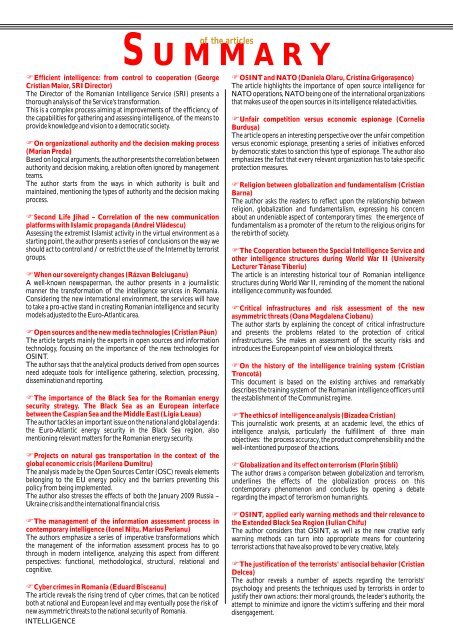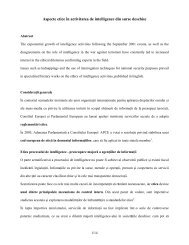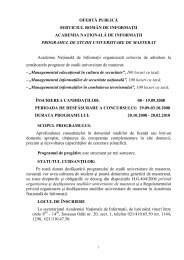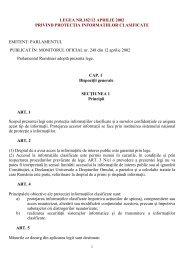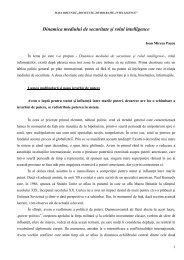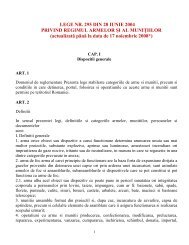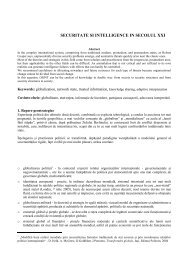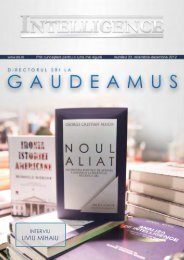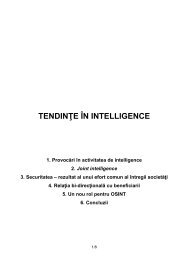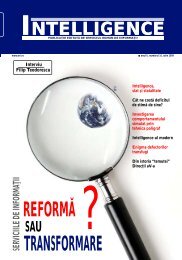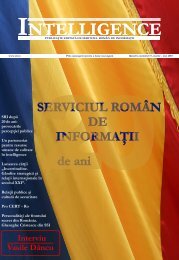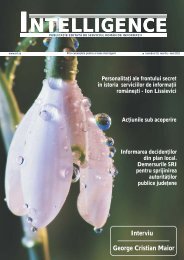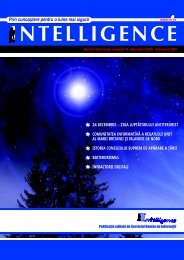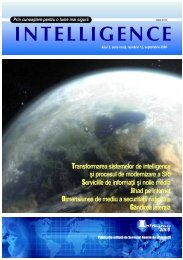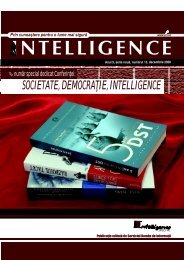INTELLIGENCE INTELLIGENCE - Serviciul Român de Informaţii
INTELLIGENCE INTELLIGENCE - Serviciul Român de Informaţii
INTELLIGENCE INTELLIGENCE - Serviciul Român de Informaţii
Create successful ePaper yourself
Turn your PDF publications into a flip-book with our unique Google optimized e-Paper software.
S<br />
of the articles<br />
U M M A R Y<br />
�Efficient intelligence: from control to cooperation (George �OSINT and NATO (Daniela Olaru, Cristina Grigoraşenco)<br />
Cristian Maior, SRI Director)<br />
The article highlights the importance of open source intelligence for<br />
The Director of the Romanian Intelligence Service (SRI) presents a NATO operations, NATO being one of the international organizations<br />
thorough analysis of the Service's transformation.<br />
This is a complex process aiming at improvements of the efficiency, of<br />
that makes use of the open sources in its intelligence related activities.<br />
the capabilities for gathering and assessing intelligence, of the means to<br />
provi<strong>de</strong> knowledge and vision to a <strong>de</strong>mocratic society.<br />
�Unfair competition versus economic espionage (Cornelia<br />
Burduşa)<br />
The article opens an interesting perspective over the unfair competition<br />
�On organizational authority and the <strong>de</strong>cision making process versus economic espionage, presenting a series of initiatives enforced<br />
(Marian Preda)<br />
by <strong>de</strong>mocratic states to sanction this type of espionage. The author also<br />
Based on logical arguments, the author presents the correlation between emphasizes the fact that every relevant organization has to take specific<br />
authority and <strong>de</strong>cision making, a relation often ignored by management<br />
teams.<br />
protection measures.<br />
The author starts from the ways in which authority is built and<br />
maintained, mentioning the types of authority and the <strong>de</strong>cision making<br />
process.<br />
�Religion between globalization and fundamentalism (Cristian<br />
Barna)<br />
The author asks the rea<strong>de</strong>rs to reflect upon the relationship between<br />
�Second Life Jihad – Correlation of the new communication<br />
religion, globalization and fundamentalism, expressing his concern<br />
www.nato.int<br />
about an un<strong>de</strong>niable aspect of contemporary times: the emergence of<br />
platforms with Islamic propaganda (Andrei Vlă<strong>de</strong>scu)<br />
fundamentalism as a promoter of the return to the religious origins for<br />
Assessing the extremist Islamist activity in the virtual environment as a<br />
starting point, the author presents a series of conclusions on the way we<br />
the rebirth of society.<br />
should act to control and / or restrict the use of the Internet by terrorist<br />
groups.<br />
�The Cooperation between the Special Intelligence Service and<br />
other intelligence structures during World War II (University<br />
Lecturer Tănase Tiberiu)<br />
�When our sovereignty changes (Răzvan Belciuganu)<br />
The article is an interesting historical tour of Romanian intelligence<br />
A well-known newspaperman, the author presents in a journalistic structures during World War II, reminding of the moment the national<br />
manner the transformation of the intelligence services in Romania.<br />
Consi<strong>de</strong>ring the new international environment, the services will have<br />
intelligence community was foun<strong>de</strong>d.<br />
to take a pro-active stand in creating Romanian intelligence and security<br />
mo<strong>de</strong>ls adjusted to the Euro-Atlantic area.<br />
�Critical infrastructures and risk assessment of the new<br />
asymmetric threats (Oana Magdalena Ciobanu)<br />
The author starts by explaining the concept of critical infrastructure<br />
�Open sources and the new media technologies (Cristian Păun) and presents the problems related to the protection of critical<br />
The article targets mainly the experts in open sources and information infrastructures. She makes an assessment of the security risks and<br />
technology, focusing on the importance of the new technologies for<br />
OSINT.<br />
introduces the European point of view on biological threats.<br />
The author says that the analytical products <strong>de</strong>rived from open sources<br />
need a<strong>de</strong>quate tools for intelligence gathering, selection, processing,<br />
dissemination and reporting.<br />
�On the history of the intelligence training system (Cristian<br />
Troncotă)<br />
This document is based on the existing archives and remarkably<br />
<strong>de</strong>scribes the training system of the Romanian intelligence officers until<br />
�The importance of the Black Sea for the Romanian energy<br />
security strategy. The Black Sea as an European interface<br />
the establishment of the Communist regime.<br />
between the Caspian Sea and the Middle East (Ligia Leaua) �The ethics of intelligence analysis (Biza<strong>de</strong>a Cristian)<br />
The author tackles an important issue on the national and global agenda: This journalistic work presents, at an aca<strong>de</strong>mic level, the ethics of<br />
the Euro-Atlantic energy security in the Black Sea region, also intelligence analysis, particularly the fulfillment of three main<br />
mentioning relevant matters for the Romanian energy security. objectives: the process accuracy, the product comprehensibility and the<br />
well-intentioned purpose of the actions.<br />
�Projects on natural gas transportation in the context of the<br />
global economic crisis (Marilena Dumitru) �Globalization and its effect on terrorism (Florin Ştibli)<br />
The analysis ma<strong>de</strong> by the Open Sources Center (OSC) reveals elements The author draws a comparison between globalization and terrorism,<br />
belonging to the EU energy policy and the barriers preventing this un<strong>de</strong>rlines the effects of the globalization process on this<br />
policy from being implemented. contemporary phenomenon and conclu<strong>de</strong>s by opening a <strong>de</strong>bate<br />
The author also stresses the effects of both the January 2009 Russia – regarding the impact of terrorism on human rights.<br />
Ukraine crisis and the international financial crisis.<br />
�The management of the information assessment process in<br />
contemporary intelligence (Ionel Niţu, Marius Perianu)<br />
The authors emphasize a series of imperative transformations which<br />
the management of the information assessment process has to go<br />
through in mo<strong>de</strong>rn intelligence, analyzing this aspect from different<br />
�OSINT, applied early warning methods and their relevance to<br />
the Exten<strong>de</strong>d Black Sea Region (Iulian Chifu)<br />
The author consi<strong>de</strong>rs that OSINT, as well as the new creative early<br />
warning methods can turn into appropriate means for countering<br />
terrorist actions that have also proved to be very creative, lately.<br />
perspectives: functional, methodological, structural, relational and<br />
cognitive.<br />
�The justification of the terrorists' antisocial behavior (Cristian<br />
Delcea)<br />
�Cyber crimes in Romania (Eduard Bîsceanu)<br />
The article reveals the rising trend of cyber crimes, that can be noticed<br />
both at national and European level and may eventually pose the risk of<br />
new asymmetric threats to the national security of Romania.<br />
<strong>INTELLIGENCE</strong><br />
The author reveals a number of aspects regarding the terrorists'<br />
psychology and presents the techniques used by terrorists in or<strong>de</strong>r to<br />
justify their own actions: their moral grounds, the lea<strong>de</strong>r's authority, the<br />
attempt to minimize and ignore the victim's suffering and their moral<br />
disengagement.


